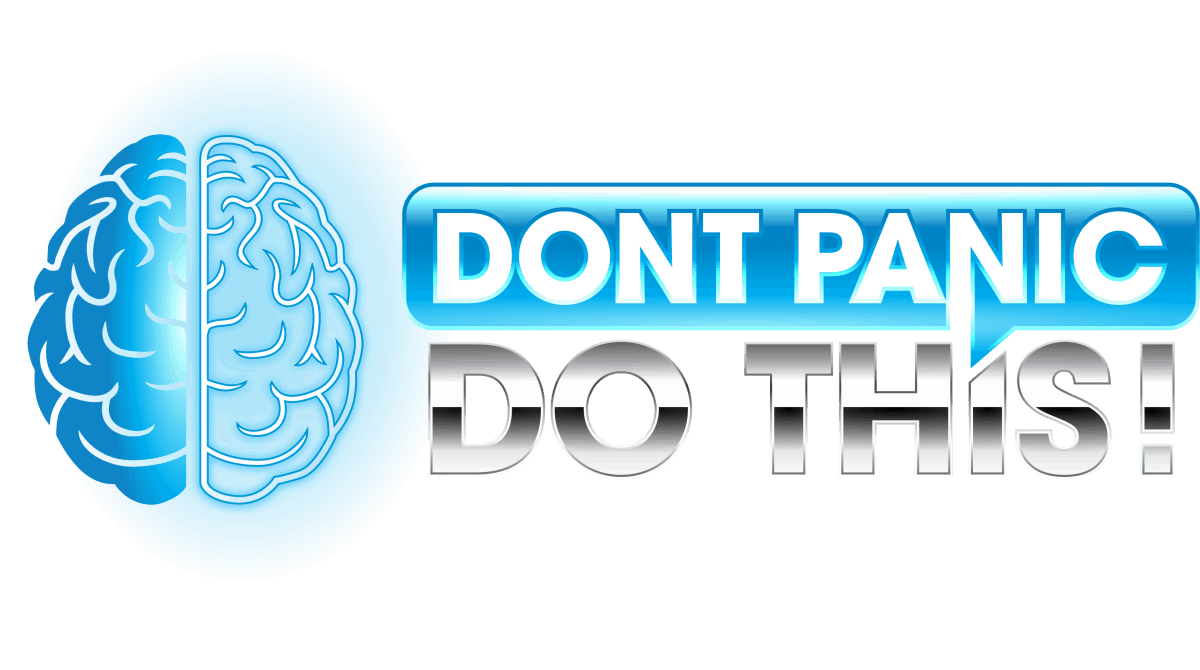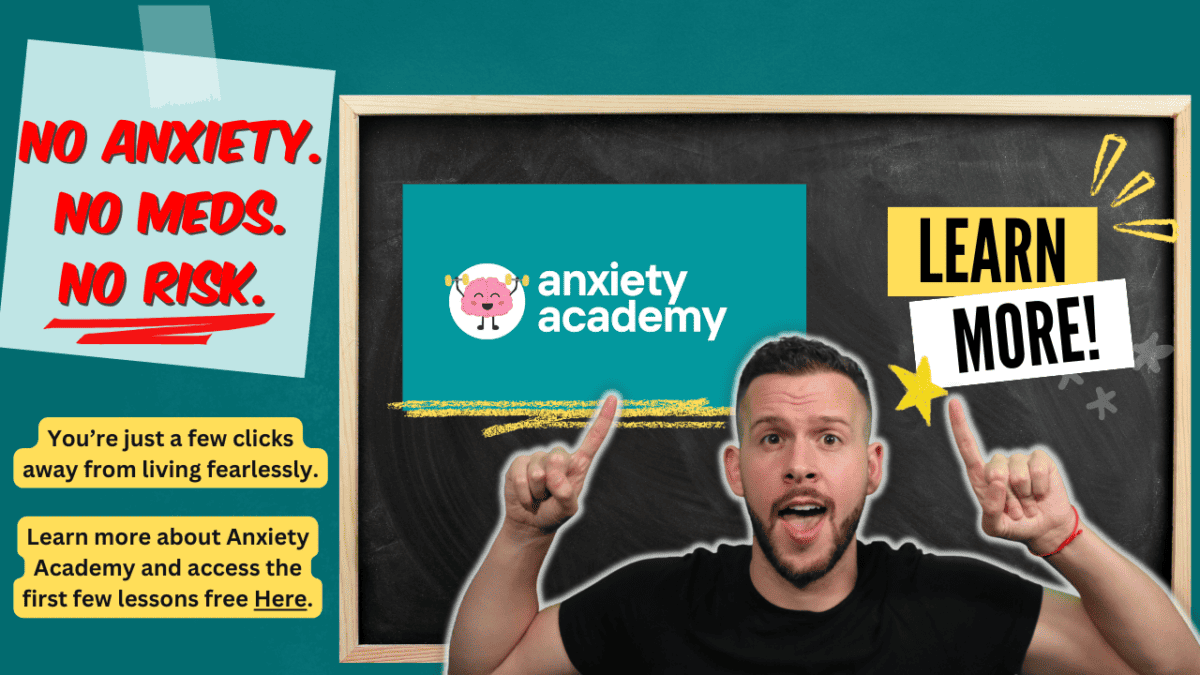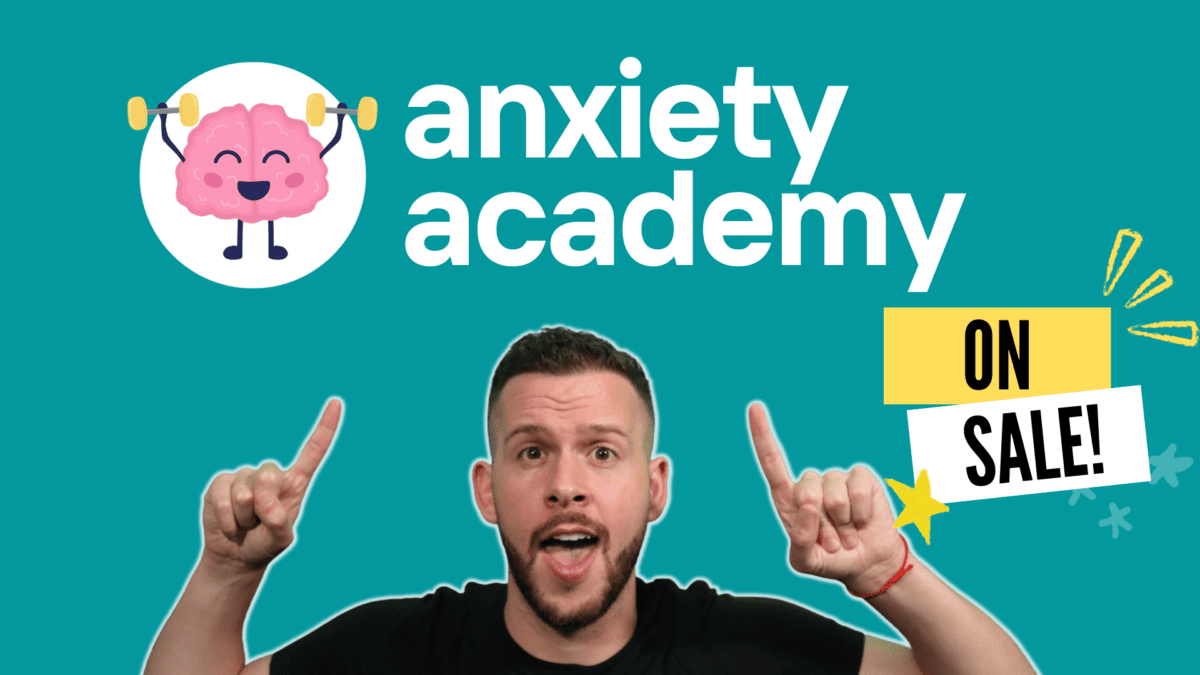Walking through the tea aisle of any supermarket, it’s clear that many options exist for bedtime and stress relief teas. With so many options available, it’s easy to feel overwhelmed. That’s why I decided to test over 20 different teas to determine… What is the best tea for anxiety?
From the 20+ teas tested, Yogi Bedtime Tea was the best at relieving my feelings of anxiety. Passionflower, valerian, chamomile, lavender, and other ingredients in this blend combine to create an incredible stress relief tea. After a bag or two of Yogi Bedtime Tea, I feel significantly more relaxed and less stressed out.
That’s the short answer for me. The long answer, however, can be a bit more complicated. The best tea for anxiety may be different for you.
Read on, and I’ll explain the most common stress-reducing tea ingredients, as well as ranking each tea and explaining who they may be right for.
The Competitors for the Best Tea for Anxiety
It’s important to note that I am not a doctor, and none of these teas are intended to treat, diagnose, prevent, or cure any medical condition. Anyone taking any kind of medication should consult with their doctor before trying a new tea. I do not work for any of the companies that sell these teas, and these companies do not make the claim that their tea will reduce anxiety. This experiment is based solely on my experience drinking each tea; your experience may differ.
To determine the best tea for anxiety, my first step was to gather the contestants. To do this, I visited several popular grocery stores and retailers and browsed their tea aisles; you shouldn’t have a hard time finding most of these teas locally.
Examining the labels of each tea, I opted for ones that included words like “stress,” “calm,” “sleep,” or “relaxation.” These buzzwords typically signaled the presence of ingredients that could help reduce common symptoms of anxiety. I avoided teas containing caffeine, as this could worsen anxiety for some.
- Bigelow Benefits Sleep
- Celestial Seasonings Cinnamon Apple Spice
- Celestial Seasonings Raspberry Zinger
- Celestial Seasonings Country Peach Passion
- Celestial Seasonings Wild Berry Zinger
- Celestial Seasonings True Blueberry
- Celestial Seasonings Black Cherry Berry
- Celestial Seasonings Sleepytime Extra
- Chai Diaries Chamomile Lavender
- H-E-B Organics Chamomile Premium Herbal Tea
- Lipton Stress Therapy
- Pukka Chamomile, Vanilla & Manuka Honey
- TAZO Calm Chamomile
- Traditional Medicinals Organic Nighty Night
- Traditional Medicinals Organic Nighty Night Extra
- Versana Organic Slumber
- Yogi Bedtime
- Yogi Honey Lavender Stress Relief
- Yogi Soothing Caramel Bedtime
- Yogi Sweet Clementine Stress Support
- Yogi Kava Stress Relief
(Some brands come up more than others. This wasn’t because of any bias on my part; these brands just seemed to offer more variety with regard to herbal teas for relaxation.)
Once I had a nice collection of 20+ different teas to sample, I began casually trying one or two of them (spaced out) throughout the day. This helped to give me a quick idea of which teas did little to nothing, and which actually packed a noticeable punch. Doing so, I quickly realized a pattern and determined that certain ingredients were far more effective than others at reducing my symptoms of anxiety.
The Most Common Anti-Anxiety Tea Ingredients
When searching for the best tea for anxiety, a few ingredients came up time and time again. There are certain ingredients I learned to expect results from, and others that fell short.
I want to discuss the most significant ingredients I found in these anti-anxiety teas. Some of these I definitely felt working, some may have contributed a bit, and others were probably just there for flavoring. I’ll put each ingredient into a category based on its perceived effectiveness.
If you want to try a tea that’s not on this list, recognizing these ingredients could be useful.
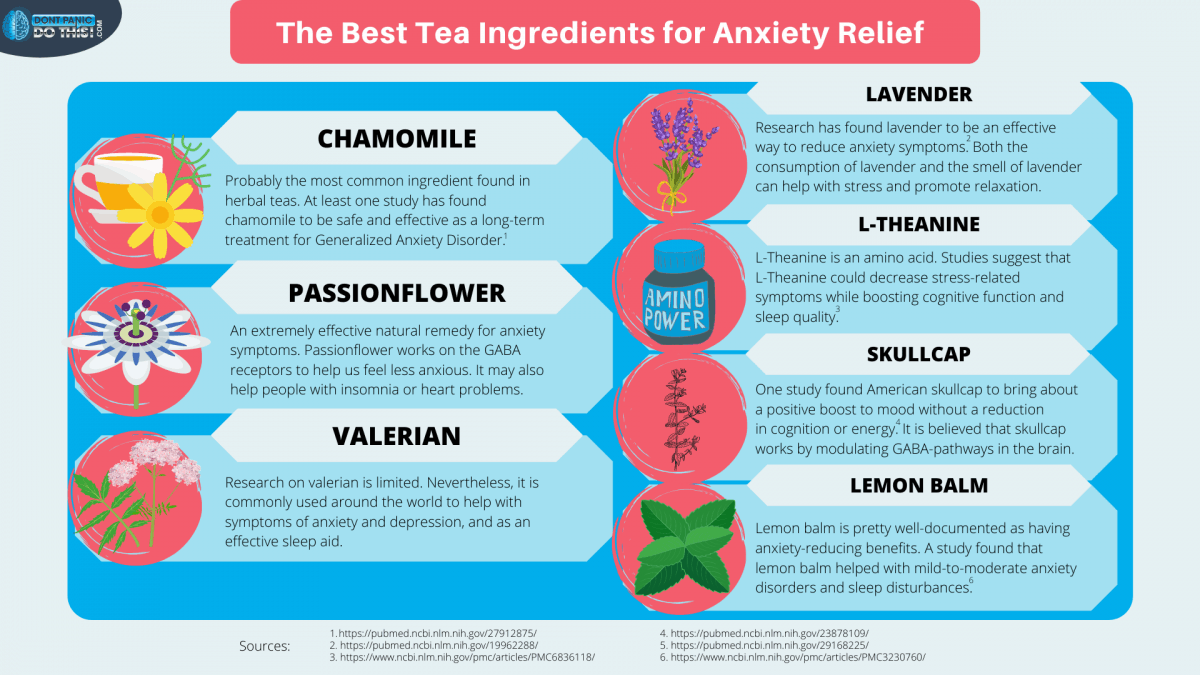
Hands down the most common ingredient found in any herbal tea blend. Chamomile is known to reduce stress and anxiety, and one study found it safe and effective as a long-term treatment for GAD (Generalized Anxiety Disorder).
Chamomile can definitely help you to relax a bit, but it’s very mild in my opinion. Many people may not feel that chamomile alone makes a significant improvement to their stress levels.
This is probably one of the most effective anti-anxiety herbs I’ve found so far. Passionflower may seem mild compared to powerful anti-anxiety drugs, but it works extremely well for an herbal solution. In addition to decreasing symptoms of anxiety, passionflower may also be useful for some people with insomnia or heart problems.
Check out our full article on passionflower for anxiety to learn much more about this ingredient.
Research on valerian is limited, with no clear conclusions about its effectiveness with regard to anxiety. Nevertheless, people around the world do use it for help with symptoms of anxiety and depression, and as a sleep aid.
I hate the smell of this stuff in tea, but I do find that it absolutely makes me more relaxed and ready for sleep.
While it’s easy to hear the word “lavender” and dismiss it as folklore nonsense, research has found lavender to be an effective way to reduce anxiety symptoms.
Personally, I hate the taste of lavender in tea. If I want the benefits of lavender, I much prefer getting them via an essential oil diffuser. With that said, I do believe that lavender in tea can help to reduce symptoms of anxiety.
When people talk about green tea being great for you, this is the amino acid responsible for those benefits. Obviously, none of the teas mentioned in this article are green or black tea (we’re looking at caffeine-free only), but L-theanine can still be an added ingredient.
Studies suggest that L-Theanine could decrease stress-related symptoms while boosting cognitive function and sleep quality. While my own personal experience with L-Theanine is limited as of right now, I do believe it can be an effective solution for symptoms of anxiety.
This study found American skullcap to bring about a positive boost to mood without a reduction in cognition or energy. It is believed that skullcap works by modulating GABA-pathways in the brain, suggesting its potential as an anxiolytic (anti-anxiety) supplement.
I’ve never tried skullcap by itself, but the literature looks promising to suggest that this may help to decrease feelings of anxiety.
Lemon balm is pretty well-documented as having anxiety-reducing benefits. This study found that lemon balm helped with mild-to-moderate anxiety disorders and sleep disturbances.
An “adaptogen” believed to help the body deal with stress by lowering cortisol levels. It has been used in Ayurvedic medicine for many years. This study found ashwagandha beneficial in reducing stress and anxiety, as well as improving sleep.
I believe ashwagandha is probably an effective supplement if taken regularly. However, in my experience, it does not provide an immediate, tangible decrease in anxiety.
Licorice root is another adaptogen known to help the body with stress. It is used both for flavoring and for various health benefits. Licorice root may help the adrenal glands by aiding the regulation of adrenaline and cortisol. This may decrease overall stress on the body over time, but I don’t think it’s likely that this ingredient would have an immediate impact on anxiety levels.
Speaking of adaptogens, turmeric is another very popular adaptogen that may help the body deal with stress. According to this study, the curcumin in turmeric helped to decrease PTSD and anxiety symptoms in an experiment on rats.
While turmeric does not actually appear in any of these teas, I've still seen in used in others. I believe it could be effective at decreasing stress on a systemic level, especially when taken regularly over time.
Kava is an awesome and natural way to decrease stress and anxiety. It’s been used for relaxation and even recreational use for many years by Polynesian cultures. Personally, I really enjoy drinking kava – however, I don't find it to be particularly effective as a tea ingredient.
Kava is great and worth giving a shot, but I can’t say I really felt it working in tea form. Check out this article to learn more about kava and some better ways to consume it.
Spearmint is used for a number of natural remedies. This study even found it to be effective at reducing anxiety and improving sleep in rats. In a tea, I would expect this to be present more for the flavor than for the benefits, but it may help a bit.
Like spearmint, peppermint is also used for a number of natural remedies. One study revealed that peppermint helped to reduce feelings of pain and anxiety for some. I also assume that this ingredient is mostly included in teas for the flavor profile, but believe it could also contribute a bit toward decreasing anxiety symptoms.
Cinnamon is a known stress-reducing spice. A study on mice found cinnamon extract to be effective at improving symptoms of depressive and anxiety disorders.
In teas, cardamom is probably present for its use as a flavor enhancer. One interesting study did show that cardamom helped rats to prevent developing anxious behaviors after stressful situations.
This aromatherapy study found that very brief exposure to the aroma of lemongrass has some perceived anxiolytic effects. Mixed into a tea blend, I’d be surprised if the aroma of lemongrass is strong enough to recreate these anxiolytic effects. I assume it’s mostly used for flavoring.
California Poppy is used for a number of reasons, including for anxiety reduction and sleep; However, I could not find any good scientific evidence to support claims of effectiveness for this plant.
Rooibos is a type of caffeine-free red tea. It gets points from me for being a caffeine-free alternative to black tea, green tea, or coffee. While Rooibos leaf seems to have many benefits, there are no studies suggesting that it would directly decrease anxiety.
Chicory can be found as additive to many teas, or as a substitute for coffee. It has a nutty or woody taste that can be an enjoyable natural flavor for people who do not wish to drink coffee. Chicory is not going to help you with your anxiety, it’s typically only added to tea for the flavor profile.
Most likely present primarily for the flavor. I couldn’t find any studies to suggest that lemons might help reduce anxiety. However, there is some anecdotal evidence of citrus scents reducing feelings of anxiety and stress in some people. I wouldn’t expect it to hurt or help much.
Rose hips can be a great source of vitamin C, and can be used to treat a number of health issues including osteoarthritis. However, there is no known association to suggest that rose hips can help to decrease anxiety. This ingredient is probably included for flavor.
Nutmeg is an absolutely fascinating spice that can actually be a dangerous hallucinogen in high enough dosages. With that said, I think it’s safe to assume that the nutmeg you see in teas are merely being used for flavoring. I wouldn’t expect any anti-anxiety benefits from nutmeg.
The Best Tea for Anxiety: 5 Tiers of Effectiveness
Before long, I realized that it would be impossible to rank each tea in numerical order. Minor differences would be nearly impossible to differentiate.
Rather than sweating the small stuff, I thought a tier-based system would make more sense. After trying each tea several times, I sorted them into broad groups based on how much they helped to relax me and decrease my anxiety symptoms.
The tiers range from Tier 1 to Tier 5. Teas in Tier 1 were the most effective for me; Tier 5 the least.
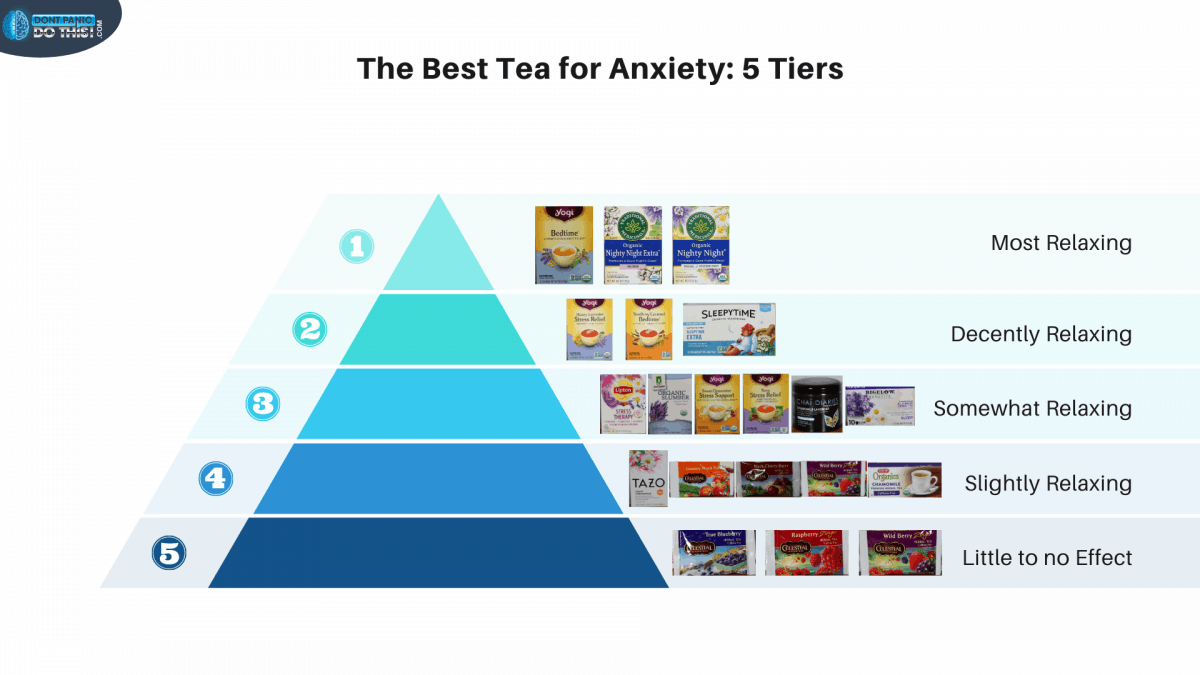



I drank each tea in this experiment on, at least, several occasions. I made sure to try each tea throughout the day, before a stressful situation, and before bed. This helped me develop a good sense of the range of usefulness for each tea. While I did find certain teas might be better for certain situations, it didn’t take me long to determine who my overall winners were.
Tier 5 (Little to no Effect):
Alright, let’s get started with a quick overview of the teas in Tier 5.
These include:
- Celestial Seasonings Raspberry Zinger
- Celestial Seasonings Wild Berry Zinger
- Celestial Seasonings True Blueberry
To be clear, I’m not claiming that the teas in Tier 5 are “bad.” They are simply not the kinds of teas you would go for if you were looking to relax or decrease stress. And, to be fair, they’re not trying to be. These are just regular, flavored herbal teas that someone might drink for the taste.
If anything, you could almost think of these teas as a sort of “control group.” None of their ingredients are known to decrease anxiety. As expected, these teas had no effect on my anxiety levels in stressful situations, or on my general relaxation levels.
There is ONE exception I would like to point out for Tier 5 (and really for any flavored drink). If there is a certain taste or scent that your brain has already learned to associate with relaxation, you may experience effects where others would not. An example of this might be a favorite tea from your childhood, or a tea you’ve been drinking for years before sleep.
Since none of them helped me to relax or destress, I won’t compare them individually here.
Tier 4 (Slightly Relaxing):
The teas in Tier 4 are where I started to feel something that could be described as relaxation. If I’m being honest, however, the mild effects were nothing to write home about.
These teas were:
- Celestial Seasonings Peach Passion
- Celestial Seasonings Black Cherry Berry
- Celestial Seasonings Cinnamon Apple Spice
- HEB Organics Chamomile
- TAZO Calm Chamomile
- Pukka Chamomile, Vanilla & Manuka Honey
The teas in this tier pretty much all had one thing in common: Chamomile.
Unlike Tier 5, these teas actually contained an ingredient known to reduce anxiety and stress. Unlike Tiers 1-3, however, these teas didn’t include much else beyond Chamomile; a few ingredients for flavoring, but nothing special for stress and anxiety.
They all tasted pretty decent, and had a very mild relaxation effect on me. I wouldn’t, however, rely on any of these teas for meaningful anxiety reduction.
The mild relaxation effect from the chamomile was pretty minimal across the board here. I won’t bother going into further detail on any of them; they all worked similarly.
Tier 3 (Somewhat Relaxing):
Tier 3 is where things start to get interesting:
- Versana Organic Slumber
- Bigelow Benefits Chamomile & Lavender Herbal Tea
- Lipton Stress Therapy
- Chai Diaries Chamomile Lavender
- Yogi Sweet Clementine Stress Support
- Yogi Kava Stress Relief
Most of these teas contain chamomile (excluding the Yogi teas). But what really puts these teas a step above the Tier 4 teas is that each blend contains multiple ingredients associated with stress relief.
I found every tea in this group to be somewhat relaxing, even taking the edge off of some mild symptoms of anxiety for me.
Let’s take a closer look at each.
Versana Organic Slumber: Contains a decent list of ingredients aimed at calming the mind and body and relieving occasional tension. Chamomile, skullcap, and lavender are the most notable ingredients in this blend.
It tastes pretty good and provided some relaxation and stress relief for me.
Bigelow Benefits Chamomile & Lavender Herbal Tea: This was the only stress-relief tea I bought that came in K-Cup (Keurig) pods. I wanted to like this tea; I really did. It contains some very solid ingredients like chamomile, passionflower, and lavender. Unfortunately, I really disliked the taste. Also, they are not very transparent about the amount of any of these ingredients in a serving. This is a dealbreaker for me, especially with stronger ingredients like passionflower.
The tea did work somewhat to help me relax and to take some of the edge off my symptoms of anxiety. I wouldn’t personally buy it again, however, due to the taste and their giving no ballpark idea of the ingredient quantities.
Lipton Stress Therapy: The ingredients list of this tea was nice and simple, which can sometimes be a good thing. Cinnamon bark, chamomile flowers, and organic lavender flowers make up the blend. Plus a few other ingredients for flavoring.
I found this tea to taste good while working decently at reducing my feelings of stress and anxiety. Lipton keeps it simple here with good tasting ingredients that somewhat took the edge off my feelings of anxiety and helped me to relax before bed.
Chai Diaries Chamomile Lavender: This tea stood out to me due to the unique and attractive packaging. It comes in a metal tin, and the tea bags themselves are beautifully made. Ingredients like chamomile, lemongrass, peppermint, and lavender may contribute to the stress-relieving and relaxing effects of this tea.
This tea was somewhat relaxing for me, and tasted pretty good as well.
Yogi Sweet Clementine Stress Support: Probably the most interesting blend in Tier 3. This tea is not directly intended for stress or anxiety relief, but rather to support overall health. Specifically, this tea is unique because it contains ashwagandha root – an adaptogen believed to help the body adapt to stress.
The tea itself has a pleasant citrus flavor to it. Unlike the other teas, this tea had almost no sedative effect at all. I didn’t feel any sort of drowsiness, but I did feel somewhat less anxious (or perhaps better able to handle stress) than usual. It’s subtle, but I did feel the stress-relief effect was present. I suspect this tea might work best if consumed occasionally over a longer period of time.
Yogi Kava Stress Relief: Pretty much the main notable ingredient in this tea was the kava. I’ve already talked a great deal about kava elsewhere on this site, and I do believe it to be an effective anxiety solution for some people. I’d be lying, however, if I said I felt that tea bags were a particularly effective way of consuming kava.
I did feel somewhat more relaxed after drinking this tea. However, for kava, this felt very weak. Perhaps it is the kava dosage, or perhaps this method of kava preparation does not result in sufficient kavalactones. In fact, I didn’t taste the kava in this tea at all; certainly not the way I would when drinking kava the traditional way. Although, perhaps that is the point.
Did this tea work? Somewhat. Would I recommend it? Not really.
If you want to give kava a shot for real, I’d personally opt for checking out a kava bar, investing in a kava shaker bottle, or trying some kava kava candy. This tea form simply does not do the plant justice.




Tier 2 (Decently Relaxing):
Tier 2 only contains three teas, and each of them did a pretty solid job of decreasing my anxiety symptoms. This is, in my opinion, where the line is drawn; where I can honestly say that these teas are actually worth your time and money.
The Tier 2 teas are:
- Yogi Honey Lavender Stress Relief
- Yogi Soothing Caramel Bedtime
- Celestial Seasonings Sleepytime Extra
Each tea in this list contains some pretty unique ingredients. Let’s explore them in greater detail.
Yogi Honey Lavender Stress Relief: Like some of the previous teas, this blend contains the classically relaxing chamomile and lavender. However, this tea also boasts a handful of other ingredients that may be beneficial: Such as lemon balm, lemongrass, spearmint, peppermint. Probably the most important, though, is passionflower extract.
This tea worked pretty well for me. It helps me to relax, or to feel calmer in situations where I may otherwise feel a bit anxious. The taste is pretty decent as well.
Yogi Soothing Caramel Bedtime: This tea blend contains some time-honored stress-relief ingredients like chamomile, skullcap, and cinnamon. It also contains a respectable list of natural ingredients that contribute to a rich and unique flavor profile. Finally, it contains organic California poppy plant and – most interestingly – L-Theanine Suntheanine.
While the chamomile, skullcap, and cinnamon form a solid base for this tea, the L-Theanine is what makes this tea really stand out. I definitely feel more relaxed after drinking this tea, and I certainly feel that it helps me to decrease my anxiety symptoms. Although I didn’t like the taste at first, it sort of grew on me and now I actually quite enjoy it.
Celestial Seasonings Sleepytime Extra: A simple but effective blend. This tea contains chamomile, tilia estrella flowers, and valerian, as well as several ingredients for flavoring. I had a hard time finding much useful information on tilia estrella, but I can definitely feel the valerian working in it.
This tea is pretty aptly named, as it makes me more tired than any of the others mentioned so far. If your intended use is sleep, this could be something that appeals to you. I feel significantly more relaxed after drinking this tea. Personally, however, I find the smell a bit off-putting, and it is not the best flavor for me.
Tier 1 (Most Relaxing):
Finally, we get to Tier 1. These were the three best teas for anxiety symptom relief for myself.
These teas not only worked the best for me, but their effects were also the most obvious.
I wasn’t left wondering, are they working yet? I felt each of these teas take effect, as I become significantly less stressed, and calmer and more relaxed after drinking them.
My Tier 1 teas included:
- Traditional Medicinals Organic Nighty Night
- Traditional Medicinals Organic Nighty Night Extra
- Yogi Bedtime Tea
While each of these teas packed a considerable punch, they didn’t all feel exactly the same.
Let’s discuss some of the differences so you can figure out which one may be best for you.
Traditional Medicinals Organic Night Night: Contrary to its name, I don’t feel that this tea makes me inherently drowsy; which is a good thing. When taken before bed, it did help me to sleep; but when taken during the day, it just helped me to feel calmer.
Aside from the flavoring ingredients, the main ingredient of this tea is passionflower; followed by chamomile, linden, catnip, and hop strobile, respectively
What you’re basically getting here is a very solid amount of passionflower and chamomile – the other ingredients are, frankly, less useful in my opinion. Nothing wrong with that, though; if you’re looking to take your stress down a notch, this tea could definitely do the trick.
Traditional Medicinals Organic Nighty Night Extra: Interestingly, Traditional Medicinals also has an “Extra” version of their Nighty Night tea. Perhaps even more interestingly, the ingredients are actually very different – hence why it’s found its own place on my list.
Nighty Night Extra contains valerian root, passionflower herb, lemon balm leaf, peppermint leaf, caraway fruit, and licorice root. The lemon balm, peppermint, and licorice root are fine, but what I’m really interested in here are the valerian and passionflower. Oddly, Nighty Night Extra contains less passionflower than the regular version. However, it also has a whopping 450mg of valerian in it, which the original does not. I really dislike the smell of the tea (valerian is not a pleasant smell for me), but the taste is quite plain and not necessarily bad.
This tea is probably the best choice for anyone who really likes valerian.
I find that valerian makes me more drowsy and tired than passionflower does; whereas passionflower seems to take the edge off my anxiety symptoms without slowing me down.
The right choice for you will likely depend on your own unique biology and personal preferences. As a sleep aid, this tea is one of the best options I’ve found. For use during the day, however, our next tea may be more ideal.
Yogi Bedtime Tea: The best tea for anxiety symptom reduction, for me, was Yogi Bedtime Tea.
In fact, let’s give this tea its own special section – They’ve earned it.
The Best Tea for Anxiety: Yogi Bedtime Tea
Another tea marketed as a sleep aid; I’ve found this to be an extremely versatile tea outside the context of sleep. The ingredients are great, the effects are great, and the situations this tea has proven itself useful to me in are great.
Let’s get into this a bit.
The Ingredients of Yogi Bedtime Tea
Here are the Supplement Facts for Yogi Bedtime Tea:




The heavy hitters in this tea are passionflower extract and valerian root extract. Unlike in Nighty Night Extra, however, this tea has significantly more passionflower than valerian. I believe this is why I feel more of a “clean” calm after drinking this tea, without the drowsiness that too much valerian can bring on.
It’s also great that this tea contains a healthy list of other ingredients that may help to relieve symptoms of anxiety and stress. Chamomile, lavender, and skullcap are great to see in this blend. Licorice root, spearmint leaf, cinnamon bark, and cardamom may also contribute a bit to the desired effects.
The remaining few ingredients, I assume, are there for flavor. In any case, the flavor of this tea is actually surprisingly delicious. As it already contains stevia leaf, many people will not even need to add any sort of sweetener.
Ultimately, I love how purposeful each ingredient seems. Many other brands seem to throw unnecessary ingredients in the mix for an illusion of complexity. Each ingredient in Yogi Bedtime Tea seems well-planned to me.
How I Use Yogi Bedtime Tea
Don’t let the name of this tea fool you, it’s good for far more than just sleep.
When I drink Yogi Bedtime Tea, I feel significantly more relaxed and less stressed out. This can make sleep easier for some, but I don’t feel that it makes me drowsy or in need of sleep.
What I really love Yogi Bedtime Tea for is for the relief of any mild anxiety symptoms I may be experiencing. Taken before a mildly stressful situation (e.g., a dentist appointment for me), this tea helps relieve the bulk of my stress. For me, this helps to significantly decrease the feeling of a panic attack coming on.
Another major draw to Yogi Bedtime Tea for me is that it’s likely safer to use on a more frequent basis than other anxiety supplements. While there are more effective solutions for stress and anxiety, many of those options should be used as occasionally as possible. Herbal tea is not typically habit-forming or addictive, so it should be safe to drink this tea fairly regularly.
As an added bonus, I find this to be one of the best solutions for hangxiety. Drinking this the day after drinking alcohol, it helps me stave off those uncomfortable post-booze jitters.
Will this tea be enough to tackle severe anxiety symptoms? Probably not. For severe and occasional anxiety, I’d probably opt for a stronger anxiety supplement. But for mild, or more frequent anxiety symptoms, I genuinely believe that this is the best option out there.
How I Prepare My Tea
To be fully transparent here, I am no tea connoisseur. I’m sure I’ll get some heat here from long-time tea lovers with more authentic tea brewing experience.
With that said, here’s how I’ve been preparing these teas.
I personally use this Keurig machine. Although I no longer drink coffee due to the effects of caffeine on my anxiety levels, I still find the machine useful. I fill it up with hot water and set it to run without a K-Cup inside. With my tea bag in a mug, I set the mug under the machine and let it do its thing for however long the instructions on the tea bag say (often 7 minutes or so).
Once the tea is ready, I use a spoon to squeeze out any extra liquid left inside the tea bag. Most of these teas instruct that it’s okay to use two tea bags if you prefer a stronger (more effective) brew.
Finally, you can opt to add whatever flavoring you’d like, if necessary. With Yogi Bedtime Tea, I actually already find the taste to be sweet; I don’t add anything to it at all. You may prefer adding lemon, honey, sweetener, etc. My advice is to avoid adding any sugar, especially before bed, as blood sugar spikes can cause feelings of anxiety in some people.
Where to Buy the Best Teas for Anxiety
All of the teas mentioned in this experiment can be found in common grocery stores and retailers. I did this intentionally so that any of you could easily follow along at home.
If you prefer to buy some tea online, here's a link to my absolute favorite and the winner of this experiment: Yogi Bedtime Tea
Now relax, and enjoy your tea!
